 Today, I’m delighted to welcome Ruth Downie back to the Roma Nova writing world. She’s talked before about historic truth and donkey poo, and wrote a poignant account ‘from below’ at the court of Boudica as part of A Year of Ravens. Of course, Roma Novans know her as the name on the endorsement for AURELIA. Today, I’m delighted to welcome Ruth Downie back to the Roma Nova writing world. She’s talked before about historic truth and donkey poo, and wrote a poignant account ‘from below’ at the court of Boudica as part of A Year of Ravens. Of course, Roma Novans know her as the name on the endorsement for AURELIA.
In 2004 Ruth was one of the winners in a televised short story competition, and the BBC’s threat to come back and see how her writing was going spurred her to finish her abandoned crime novel about a Roman army medic. To her great surprise that book—‘Medicus’—became a New York Times bestseller and The Times recommended it as one of their ‘Seven best thrillers for Christmas’. ‘Vita Brevis’, the seventh book in the acclaimed series, was published just recently. When she isn’t writing, Ruth’s happiest moments are spent grovelling in mud with an archaeological trowel.
Salve Ruth! Do tell us why you wrote VITA BREVIS!
Neither of my lead characters, Roman army doctor Ruso and his British partner, Tilla has ever been to Rome before (lots of ‘Roman’ citizens were born and died without ever seeing it) and I thought it would be fun to see what they made of it. Of course, there was a research trip involved, which helped… (Any excuse!)
Why do you think Ruso is like he is?
Poor old Ruso: he’s a man burdened with guilt. He’s the eldest son, but in following his own interests and becoming a doctor, he’s not only shocked his late father but landed his brother with the burden of the family farm — and the family. Perhaps he’s trying to make up for that guilt when he finds it very hard to say ‘no’ – to his patients, his woman, and to people who insist on presenting him with dead bodies and expecting him to do something about them. But if he doesn’t, who will?
Surrounded by men of ambition, he’s too honest to imagine himself as a success. The advances of modern medicine lie a long way in the future and like every other reputable doctor of his time, he’s aware that Fortune can be fickle and that there’s a huge amount he simply doesn’t know. Which is why charlatans who mislead patients with impossible promises make him very angry indeed.
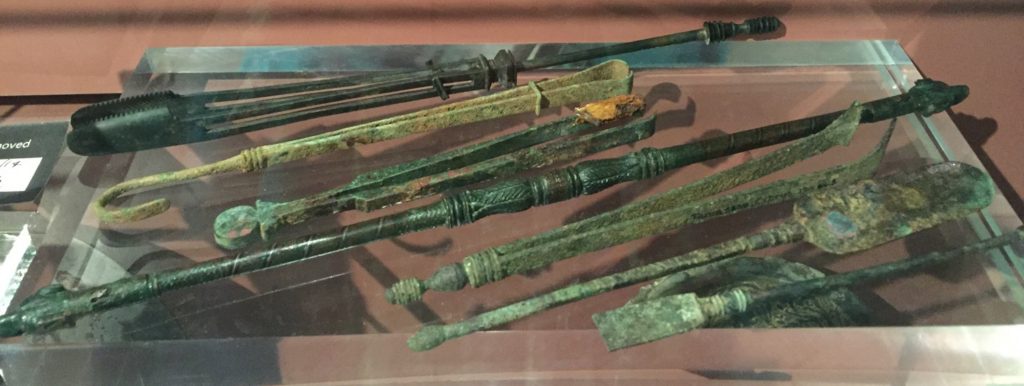 Roman medical instruments, Ashmoleon Museum What does he think he’s like?
Ruso sees himself as a man who’s doing his best in trying circumstances. He’s baffled by religion — especially his wife’s insistence on believing anything and everything — and tries to take consolation in philosophy, but people will keep interrupting.
He finds that being married to a native gives him useful insights into the minds of the Britons, which are not as clouded as his compatriots tend to assume. However, as the civilized member of the marriage he feels he has a duty to defend the superior values of Rome. This is more of a challenge than it needs to be because of Tilla’s stubborn insistence on asking awkward questions.
He’s not entirely comfortable in the company of women, having a vague suspicion they all know something he doesn’t. Being married to Tilla has helped with this, because he’s now beginning to think that whatever it is, Tilla doesn’t know it either.
Of one thing, though, he is certain. Every man has his limits. No matter what anyone else says, he is not going to make room for any more waifs, strays, unwanted slaves or other people’s unplanned babies. The Petreius household is full. (Oh, yes?)
What waits for us in Vita Brevis?
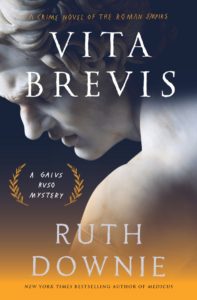 Ruso and Tilla and their new baby daughter have left Roman-occupied Britain for Rome itself. Their excitement is soon dulled by the discovery that the grand facades of polished marble mask an underworld of corrupt landlords and vermin-infested tenements. There are also far too many doctors—some skilled, but others positively dangerous. Ruso and Tilla and their new baby daughter have left Roman-occupied Britain for Rome itself. Their excitement is soon dulled by the discovery that the grand facades of polished marble mask an underworld of corrupt landlords and vermin-infested tenements. There are also far too many doctors—some skilled, but others positively dangerous.
Ruso thinks he has been offered a reputable medical practice only to find that his predecessor Doctor Kleitos has fled, leaving a dead man in a barrel on the doorstep and the warning, “Be careful who you trust.”
With Ruso’s reputation under threat, he and Tilla must protect their small family from Doctor Kleitos’s debt collectors and find allies in their new home while they track down the vanished doctor and find out the truth about the unfortunate man in the barrel.
******************
“Masterfully draws out its suspense, painting a vivid portrait of ancient Rome that feels persuasive and authentic”
—Kirkus Reviews
“Downie’s plotting is as engaging as ever… much more than a mystery novel”
—Historical Novel Society
“Reading Vita Brevis felt like catching up with old friends”
—Italophile Book Reviews
******************
Buying links: Amazon UK Book Depository Amazon US
Connect with Ruth: Website Twitter @RuthSDownie Facebook
Thank you so much for stopping by today, Ruth and bona fortuna on the rest of your blog tour. Speaking of which, here is the onward route that Ruso and Tilla are taking…
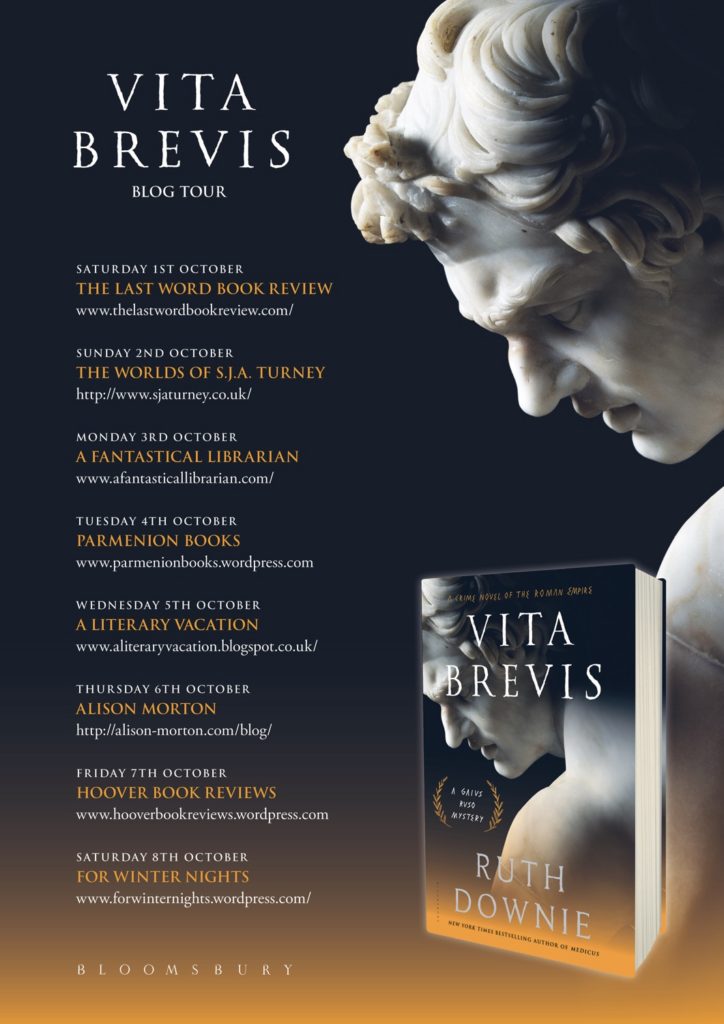
Alison Morton is the author of Roma Nova thrillers, INCEPTIO, PERFIDITAS, SUCCESSIO and AURELIA. The fifth in the series, INSURRECTIO, was published in April 2016.
Find out more about Roma Nova, its origins, stories and heroines…
If you enjoyed this post, do share it with your friends!Like this:Like Loading...
STOP PRESS: video added below!
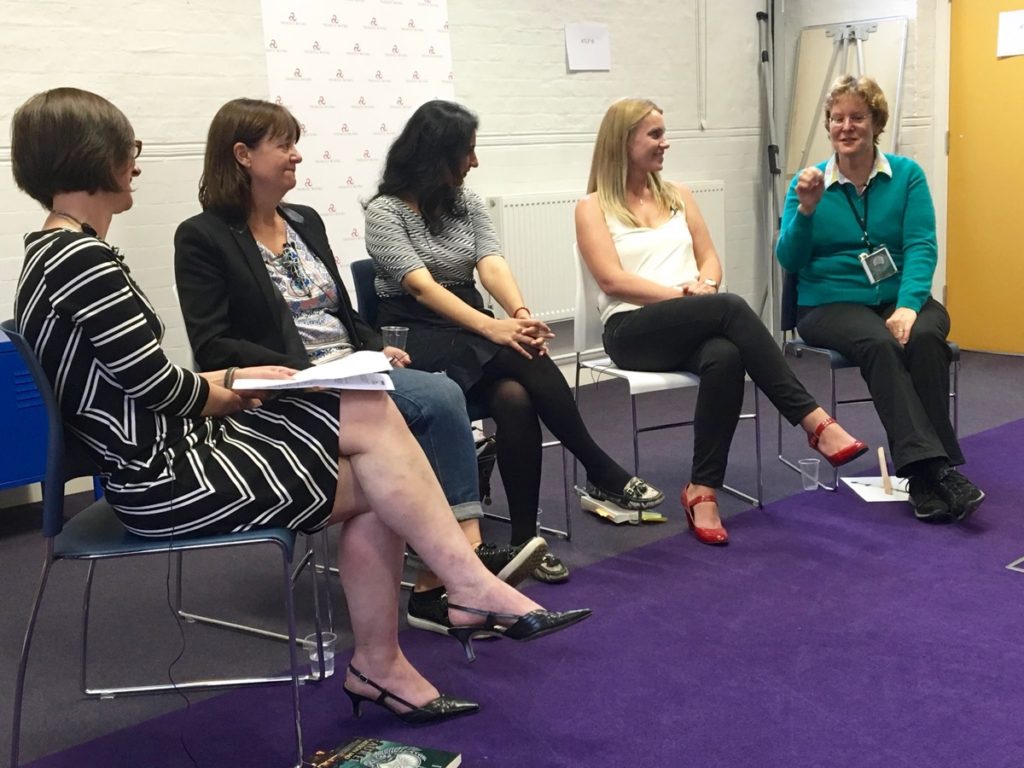 The historical fiction panel, left to right Jane Davis (chair) Orna Ross, Radhika Swarup, J D Smith and me (see video of session below!) Scarcely recovered from the Historical Novel Society Conference, I was back on the plane ten days later en route to a rainy London and going to a very different event. Not in the glamour of the hi tech Maths Institute of the University of Oxford, but in a vibrant, but modest community centre in north London. Not with the ‘big beasts’ of the historical fiction world like Tracy Chevalier and Melvyn Bragg, but amongst some of the best genre-busting, dynamic authors on the independent scene and their trade colleagues.
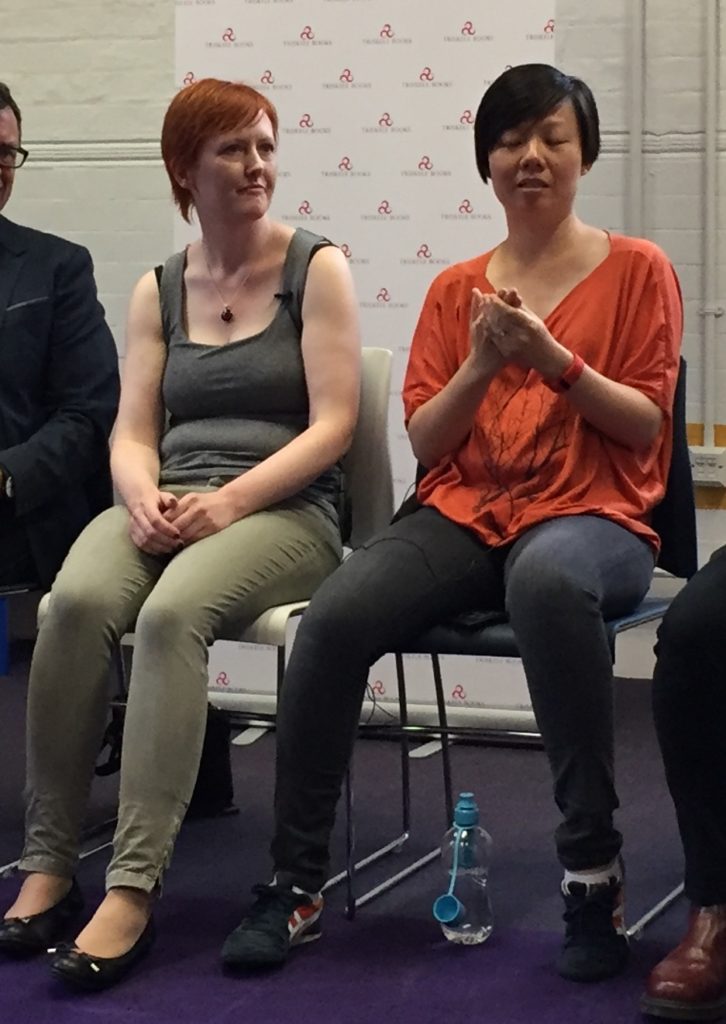 Eliza Green and Yen Ooi, sci-fi panel A free-entry festival, it attracted readers, writers, bookclubs and booksellers : all those who love the adventure of reading.
There were panels on romance, sci-fi, historical fiction crime & thrillers and literary fiction where trade, indie and small press shared the same platform. As well as sponsors’ tables and their affable representatives, there was a huge pop-up bookshop with a dedicated area for speakers’ books plus tables for other indie books and and the Alliance of Independent Authors. That room filled with talk about writing and selling !
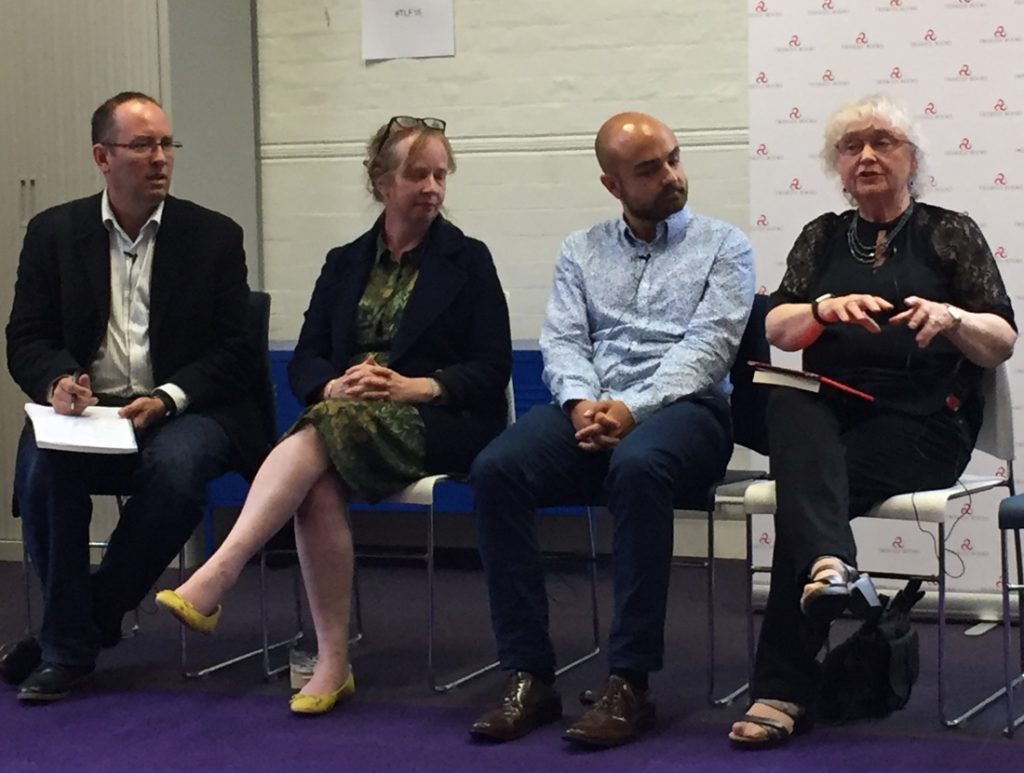 Ben Cameron, Kate Hamer, Adam Croft and Chris Longmuir talking crime and thrillers I took part on the historical fiction panel (top photo, thank you, Henry Hyde!) with Radhika Swarup, JD Smith and Orna Ross very ably chaired by Jane Davis who asked some penetrating questions about identity, historical relevance, boundaries, language and what historical fiction means. Our answers led to some lively and revealing discussions!
You can now watch on video (https://youtu.be/5HqVkEHFvFE) or below. The bit at 21.45 minutes is quite amusing…
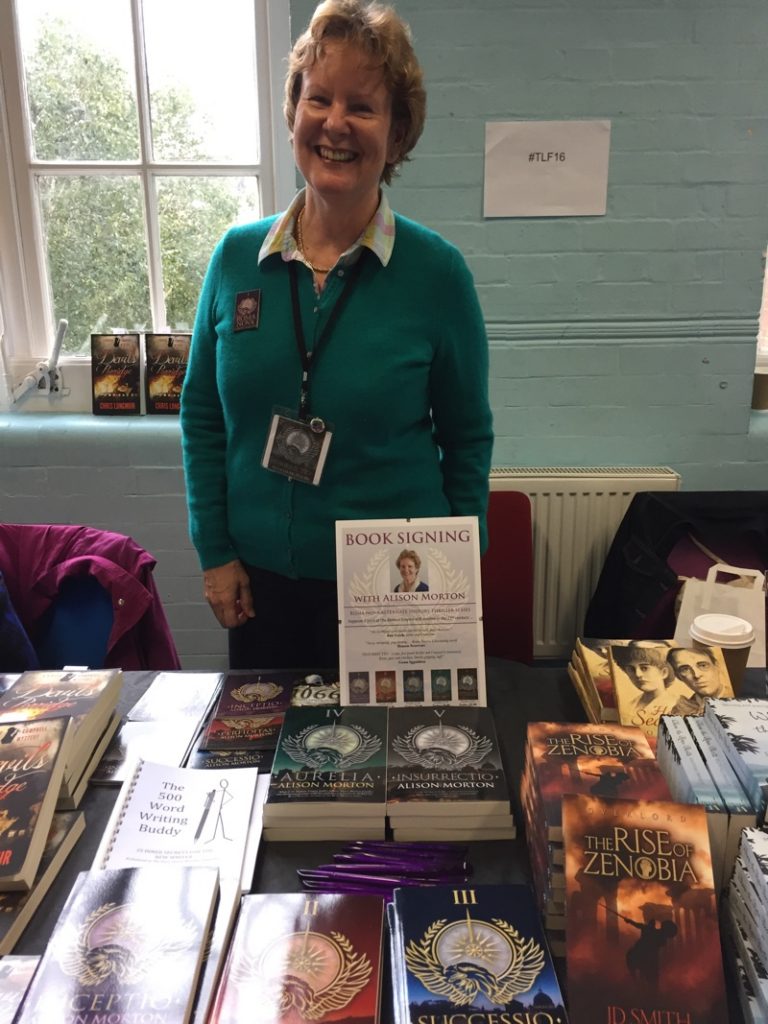
Of course, the Roma Nova novels were with me – I pack them very carefully for the plane. And I sold some 500 Word Writing Buddy copies, too!
 With Henry Hyde (Photo courtesy of Julie Lewis)
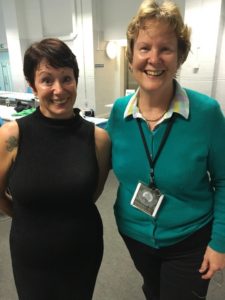 With photographer Julie Lewis
This was one of the best organised and friendliest events I’ve been to. Speakers were looked after, panels ran (mostly) to time, audiences asked excellent questions.
Above all, this litfest was FUN. And after the panels were finished, we all stayed for a glass of fizz!
Alison Morton is the author of Roma Nova thrillers, INCEPTIO, PERFIDITAS, SUCCESSIO and AURELIA. The fifth in the series, INSURRECTIO, was published in April 2016.
Find out more about Roma Nova, its origins, stories and heroines…
If you enjoyed this post, do share it with your friends!Like this:Like Loading...
 Today, my guest is Annie Whitehead,. Her first novel, To Be A Queen, the story of Aethelflaed, daughter of Alfred the Great, was long-listed for the Historical Novel Society’s 2016 Indie Award and has been awarded a B.R.A.G. Medallion. Alvar the Kingmaker has also just been award the B.R.A.G. Medallion. She has twice been a prizewinner in the Mail on Sunday Novel Writing competition, she won first prize for nonfiction in the new Writing Magazine Poetry and Prose competition and had articles published in various magazines on a wide range of topics. She is an editor for the English Historical Fiction Authors’ blog, and, most recently, contributed to the short story anthology, 1066 Turned Upside Down, in which nine authors re-imagine the events of 1066. Delighted to say it’s just been selected as HNS Indie Editors’ Choice and long-listed for the 2017 HNS Indie Award. Today, my guest is Annie Whitehead,. Her first novel, To Be A Queen, the story of Aethelflaed, daughter of Alfred the Great, was long-listed for the Historical Novel Society’s 2016 Indie Award and has been awarded a B.R.A.G. Medallion. Alvar the Kingmaker has also just been award the B.R.A.G. Medallion. She has twice been a prizewinner in the Mail on Sunday Novel Writing competition, she won first prize for nonfiction in the new Writing Magazine Poetry and Prose competition and had articles published in various magazines on a wide range of topics. She is an editor for the English Historical Fiction Authors’ blog, and, most recently, contributed to the short story anthology, 1066 Turned Upside Down, in which nine authors re-imagine the events of 1066. Delighted to say it’s just been selected as HNS Indie Editors’ Choice and long-listed for the 2017 HNS Indie Award.
A very warm welcome, Annie. Do tell us why you wrote this book!
It was a footnote, a single sentence, and it intrigued me…
Alvar, or Aelfhere to give him his Old English name, was a powerful noble during a relatively peaceful part of the tenth-century. He was described by one chronicler as the ‘mad blast of wind from the western territories’. He certainly got angry, and he certainly annoyed the Church (and thus, the chroniclers) but the same chronicler also called him a ‘glorious earl’. So why the contradiction?
I wanted to know more about this man and I wanted to write a book about him. My tutor, Ann Williams, had written a paper on Aelfhere and his illustrious family, and I still have my copy, over thirty years later.
In it, there is a footnote, about a woman, a widow, who had been deprived of lands in Aelfhere’s earldom after his death. It is the only reference to this woman, and it seemed possible, though not provable, that she was his widow.
The history had already offered up murder, dirty politics, sexual scandal and betrayal, as well as disaster (the collapse of a government building with great loss of life). Now, it had offered me a story, and a love story at that.
Who was this man, who was loathed yet admired, and who was this mystery woman?
Why do you think Alvar is like he is?
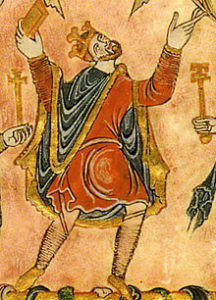 The story begins with a broken oath – why did Alvar break his vow but then remain so loyal thereafter? The previous king was profligate and Alvar realised this. He saw strength in King Edgar, who proved to be a formidable ruler; earning the epithet ‘peaceable’ was no mean achievement in these volatile times. When his beloved king died, Alvar’s frustration with his enemies boiled over, and of course the king was not there to rein him in. The story begins with a broken oath – why did Alvar break his vow but then remain so loyal thereafter? The previous king was profligate and Alvar realised this. He saw strength in King Edgar, who proved to be a formidable ruler; earning the epithet ‘peaceable’ was no mean achievement in these volatile times. When his beloved king died, Alvar’s frustration with his enemies boiled over, and of course the king was not there to rein him in.
Despite how the story begins, ‘loyalty’ is the watchword:
He remained childless, there’s no record of his marriage. If that tiny footnote can lead us to the supposition that the mystery woman was his ‘widow’, then he sacrificed a great deal of personal happiness in order to serve his king.
He earns a reputation as a ladies’ man, lacking in social graces and not keen to settle down. Yet few know of his heartache and his bluster is just that – a way of hiding his feelings. Perhaps he hides them too well – he sees himself as the queen’s protector, but she thinks his feelings go much deeper…
With the queen accused of regicide, and the country at civil war, Alvar becomes the consummate politician, brokers a peace, and secures the succession.
From ‘mad blast’ to glorious’ is a contradiction. But the real paradox is that the man who thinks he must prove his loyalty is driven by innate, unswerving loyalty anyway.
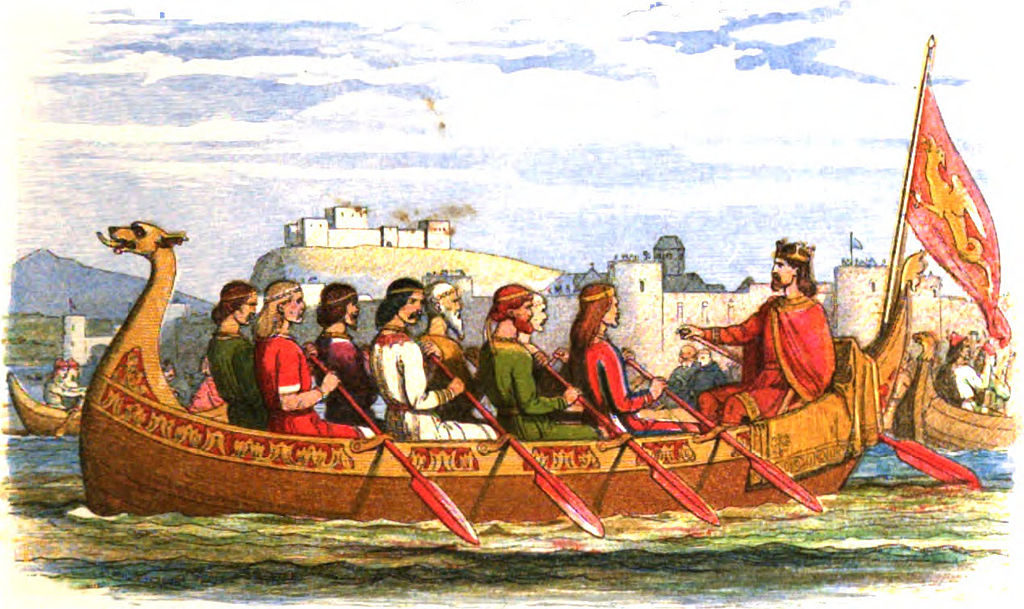 Edgar crossing the Dee What does Alvar think he is like?
“I don’t believe that I deserve my success. The hold-oath, sworn to my lord the king, was binding, and I broke that bond when I swore instead to Edgar. I live with this guilt, and I cannot shake the feeling that I walked into a position of authority without really earning it.
I know I speak bluntly – some might say rudely – and yet, perversely, I hate myself for being tongue-tied whenever I am near Káta. I am in love with this woman, who cannot be mine – she is married to my steadfast right-hand-man, who would willingly put himself between me and the enemy’s spear. At first, I didn’t know how I felt about her; I visited her house often, but thought that I was merely seeking the calm of her rural home as a salve for the poison of the court.
Some praise my skills as a swordsman, but I take no particular pride in this. All men of my standing are expected to be able to fight, and fight well.
I have a quick temper, but I do try to control it. At one gathering, I was proud to keep my tongue firmly behind my teeth until I could move away from my most deadly enemy. Although, as I remarked when asked if I was behaving myself, “Rotting crow-body – I should have felled him where he stood.”
And I should have done, with hindsight. Was I a ‘mad blast’? Yes, when I needed to be. Was I ‘glorious’? No. I acted because I loathe hypocrisy – how can Churchmen condemn sin and condone it all in the same breath? They sought to ruin people’s lives and fill their own money chests, and everything I did, I did for those whom I loved, to protect them if I could. Who would not do the same?”
So what’s Alvar the Kingmaker about?
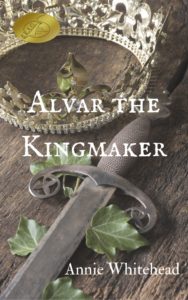 It’s a tale of politics, intrigue, deceit and murder set in tenth-century England. Nobleman Alvar knows that securing the throne for the young and worthy King Edgar will brand him as an oath-breaker. As a fighting man, he is indispensable to the new sovereign, but his success and power gain him deadly, murderous enemies amongst those who seek favour with the king, and point the finger of suspicion when Edgar’s brother, the previous king, dies in mysterious circumstances. Alvar must fight to protect his lands, and his position, and learn the subtle art of politics. He must also, as a man of principle, keep secret his love for the wife of his trusted deputy. Civil war erupts, and Alvar once again finds himself the only man capable of setting a new king upon the throne of England, an act which comes at great personal cost. His career began with a dishonourable deed to help a good king; now he must be loyal to a new king, Aethelred, whom he knows will be weak, and whose supporters have been accused of regicide. Can he bring about peace, reconcile with his enemies, and find personal happiness, whilst all the time doing his duty to his loved ones? And what of the fragile Queen, who not only depends upon him but has fallen in love with him? It’s a tale of politics, intrigue, deceit and murder set in tenth-century England. Nobleman Alvar knows that securing the throne for the young and worthy King Edgar will brand him as an oath-breaker. As a fighting man, he is indispensable to the new sovereign, but his success and power gain him deadly, murderous enemies amongst those who seek favour with the king, and point the finger of suspicion when Edgar’s brother, the previous king, dies in mysterious circumstances. Alvar must fight to protect his lands, and his position, and learn the subtle art of politics. He must also, as a man of principle, keep secret his love for the wife of his trusted deputy. Civil war erupts, and Alvar once again finds himself the only man capable of setting a new king upon the throne of England, an act which comes at great personal cost. His career began with a dishonourable deed to help a good king; now he must be loyal to a new king, Aethelred, whom he knows will be weak, and whose supporters have been accused of regicide. Can he bring about peace, reconcile with his enemies, and find personal happiness, whilst all the time doing his duty to his loved ones? And what of the fragile Queen, who not only depends upon him but has fallen in love with him?
Thank you so much for stopping by today, Annie, and good luck with Alvar!
********
You can buy Alvar the Kingmaker here.
Connect with Annie on Twitter, Facebook, visit her Amazon page and her website.
Updated August 2020: Alison Morton is the author of Roma Nova thrillers – INCEPTIO, PERFIDITAS, SUCCESSIO, AURELIA, INSURRECTIO and RETALIO. CARINA, a novella, and ROMA NOVA EXTRA, a collection of short stories, are now available. Audiobooks are available for four of the series. NEXUS, an Aurelia Mitela novella, is now out.
Find out more about Roma Nova, its origins, stories and heroines… Download ‘Welcome to Roma Nova’, a FREE eBook, as a thank you gift when you sign up to Alison’s monthly email newsletter. You’ll also be first to know about Roma Nova news and book progress before everybody else, and take part in giveaways.
If you enjoyed this post, do share it with your friends!Like this:Like Loading...
 Today I’m delighted to welcome historical fiction writer Derek Birks and his fearsome character Ned Elder. Derek was born in Hampshire, England but spent his teenage years in New Zealand, where he still has strong family ties. After many years teaching history he took early retirement to concentrate on writing. He also spends his time gardening, travelling, walking and taking part in archaeological digs at a Roman villa. Today I’m delighted to welcome historical fiction writer Derek Birks and his fearsome character Ned Elder. Derek was born in Hampshire, England but spent his teenage years in New Zealand, where he still has strong family ties. After many years teaching history he took early retirement to concentrate on writing. He also spends his time gardening, travelling, walking and taking part in archaeological digs at a Roman villa.
Derek’s favourite period is the late medieval and he writes action-packed fiction rooted in accurate history. His debut historical novel, Feud, is set during the Wars of the Roses and is the first in the Rebels & Brothers series following the fortunes of the fictional Elder family. The fourth and final book of the series, The Last Shroud, was published in 2015. But fans will be relieved to hear that the Elders will return in Scars from the Past, the first of a new series, in December 2016.
Welcome, Derek. Why did you write this book?
I started writing Feud – my debut novel – about ten years ago. I had always wanted to write stories of adventure and action but had never found the time to do it. Work commitments meant that I found it impossible to give my writing the dedicated time it required. So I went part-time but, even then, I still could not find enough hours in the day to write. Finally, I took early retirement and committed full time to writing. The idea of writing Feud was not just a decision to write, but a decision to change what I did with my life.
Why the Wars of the Roses? In my former life I was a history teacher and my favourite period of history was a stick of rock with the word Plantagenet running through it. The events – well you couldn’t make them up. What I wanted to do was write a story with a raw edge to it: fast, brutal and real. I wanted young fictional characters to interact with the actual historical figures. There had to be both male and female protagonists and I wanted the reader to be constantly surprised about what would happen to the characters next – right up to the last page. The result is Feud and I hope it fulfils what I set out to achieve.
Who is your main character?
One of the heroes in Feud is Ned Elder, a young Yorkshire knight on the eve of the outbreak of the Wars of the Roses. Ned did not change very much in all the time I was writing Feud. He’s young: around 18 when the story begins in September 1459. He is a second son and thus inexperienced, untrained in estate management, strategy or leading men in battle.
He is a skilled swordsman, though he relies on strength rather than finesse. In battle, he is headstrong and frequently careless of his own safety – and probably that of others.
Ned has his own code of honour and when his family is brutally attacked he is stunned. He can make no sense of it. He is clutching at plans of action. His sisters have been abducted, so he should try to rescue them. His lands have been taken, so he should try to win them back, etc, etc. But how he might actually achieve any of these things, he has no idea.
Feud is about how Ned tries – in his own somewhat bludgeoning style – to recover what has been lost. Ned and his two sisters – the other main protagonists – are all young and they make mistakes as young people do. Does Ned learn from his mistakes? Yes, he does, but not before the end of Feud.
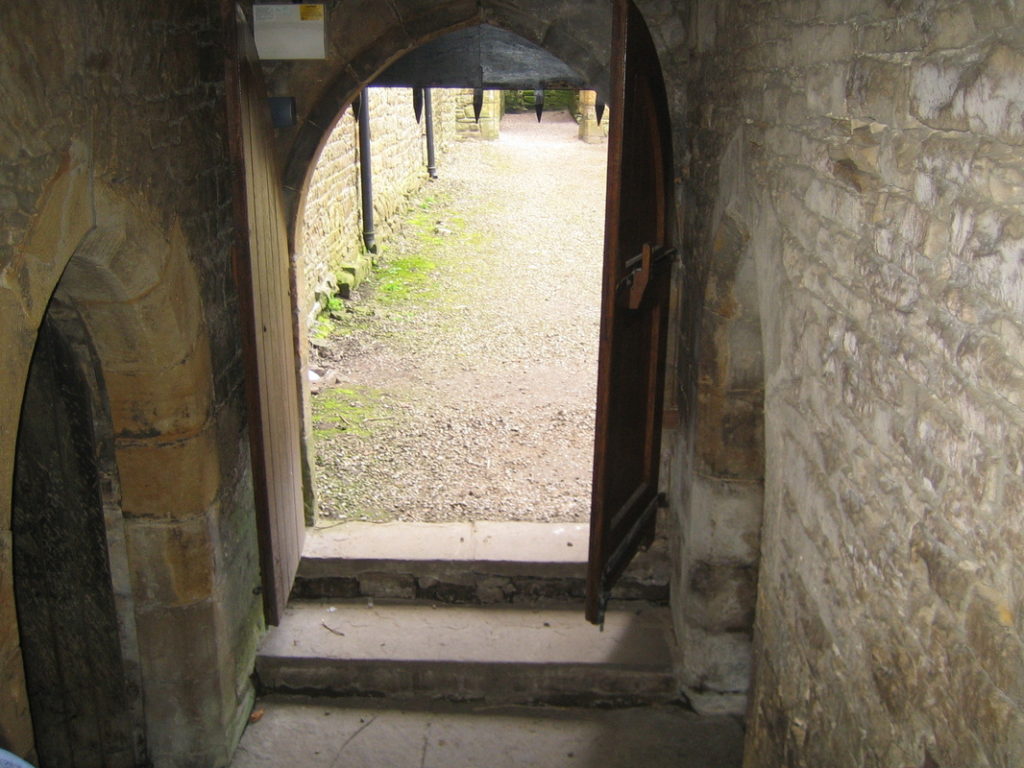 “Yoredale Castle” (alias Bolton Castle) Why do you think Ned Elder is like he is?
My hero, in a time of war, needs to have martial skills. That is an essential ingredient: he is a warrior with a warrior’s spirit. I want him to protect the weak and to be true to himself.
BUT… such characters are often painted as flawless: always right, endlessly decisive and always arriving in the nick of time to save the day. I wanted Ned to seem real, which means to be flawed: sometimes arriving too late to save the day, sometimes making the wrong call with fatal consequences for those he loves and sometimes utterly overwhelmed by what he faces.
Some readers find this annoying; they also find it annoying that the mistakes this young, untried leader makes cause people to be killed. But that’s what can happen in life. Over the four books of this series, Ned changes. As he gets older he learns – as hopefully we all do – from experience.
What does Ned think he is like?
Ned sees himself through a fifteenth century lens as a Christian knight, a man of honour. He also sees his future path as a follower not a leader because he expects that his older brother, Thomas, will inherit the family estates.
A second son is a “spare” so he is unlikely to enter the church. More usually, he is trained as a soldier and destined to play a supporting role to his elder brother. Ned idolises Thomas and is comfortable in the supporting role. He seeks no more than that. He envisages life as a soldier, perhaps fighting overseas at some point as his own father had fought in the French wars in the 1440s.
When “all hell breaks loose” Ned feels cast adrift because all the certainties of his world have been removed: father, brother, sisters, lands, home… To him, it’s as if all that has happened up to that moment is irrelevant, meaningless. He must play a different role from that which he always expected.
Which of us would not struggle to adapt to such a situation at the age of 18?
He can rely on only a few followers but they expect him to lead them and he does not know how to lead. Ned falls back on what he knows best: how to wield a sword. He therefore leads in a very blunt and warlike manner. Throughout the story, Neds finds it difficult to believe what is happening to him and his supporters. He becomes more brutal and ruthless, propelled by rage and thoughts of revenge.
His relationship with Amelie, a French girl he meets along the way, is clouded by the violence that strikes at them all. He cannot, as she sometimes does, seek solace in the church. He is close to despair and the only way forward he can see is to fight. His desperation leads him to accept that he may very well not survive the struggle.
You may think that Ned Elder sounds rather rash but you wouldn’t if you met his sister, Eleanor… but that’s another story…
(One which we must hear about sometime!)
thank you Derek (and Ned) for being my guests today.
So what’s Feud about?
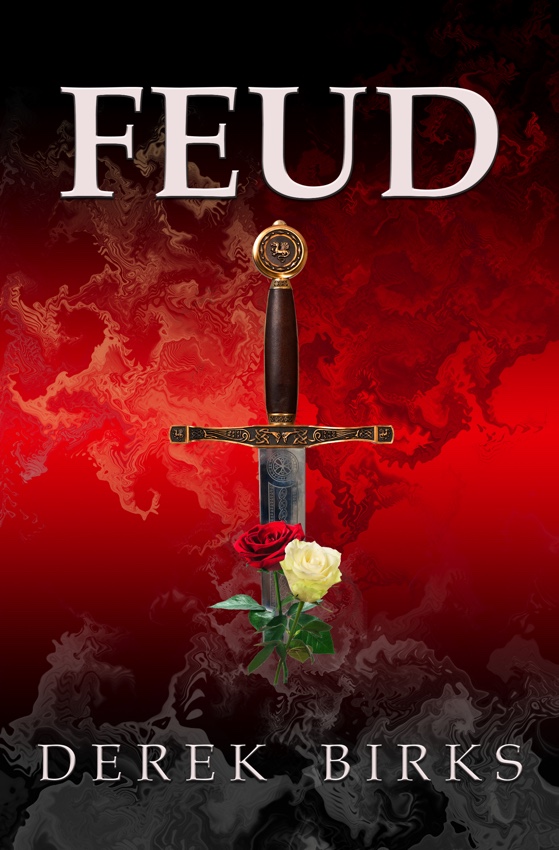 1459. England stands on the brink of chaos and as the Wars of the Roses begin, the rule of law breaks down… 1459. England stands on the brink of chaos and as the Wars of the Roses begin, the rule of law breaks down…
Whilst York and Lancaster go to war for the throne, in the heart of Yorkshire the Radcliffe family have an old score to settle with their neighbours, the Elders.
When the feud breaks out, Ned Elder is a young, untried knight. With his father executed, his older brother butchered and his two sisters roughly abducted, it seems that Ned is the family’s last hope of survival. Yet he barely escapes with his life and is pursued across the land with only a few loyal companions. To defeat the Lancastrian Radcliffes, Ned must join the civil war on the side of York, but victory seems a long way off.
Imprisoned in a remote nunnery, his wild and rebellious sister, Eleanor, has not given up but can she find the strength to fight back? The fate of the Elders will hang as much upon the courage of Ned’s sisters as his own skill with a sword.
As the civil war rages across the snow-covered battlefield of Towton, the Elders fight for survival and the bitter feud is played out to its bloody conclusion.
“From the eye-catching cover to the last page, Feud is an exciting story of survival through personal upheaval during a vicious war, where the outcome is not always certain.” Historical Novel Society.
Feud is the first of a four book series entitled Rebels and Brothers. The story continues in A Traitor’s Fate.
Links to Amazon.co.uk and Amazon.com
Connect with Derek via Twitter (@feud_writer), website and blog.
Alison Morton is the author of Roma Nova thrillers, INCEPTIO,
PERFIDITAS, SUCCESSIO and AURELIA. The fifth in the series, INSURRECTIO, was published in April 2016.
Find out more about Roma Nova, its origins, stories and heroines…
If you enjoyed this post, do share it with your friends!Like this:Like Loading...
The 2016 Historical Novel Society in Oxford – fabulous speakers, sharp engaging talks, lively expert panels plus rampaging Saxons – a celebration of all things historical and fictional. This was the feast before us.
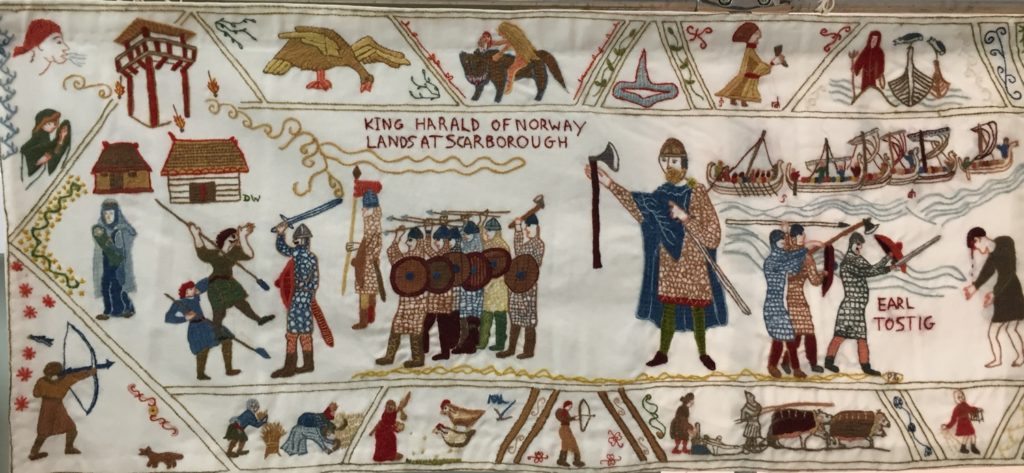 Battle of Fulford 1066 tapestry. (Click image for more info) Many colleagues have written accounts which make compelling reading for different reasons. I’ve picked out a few I that made me laugh and/or made me think:
Christina Courtenay
Anita Chapman
Ruth Downie
Lorna Fergusson, here and here.
I’m not going to duplicate their excellent posts, but I urge you to read them!
So, my little interim post gave a few glimpses of the weekend. But my involvement with the conference began last year. I was asked to join the organising committee and became the deputy publicity officer working alongside publicity officer Anita Chapman who runs the social media consultancy neetsmarketing. I also took on responsibility for co-ordinating indie activities including an indie display table and (with Helen Hollick) an indie panel. Somehow I volunteered for front of house (problem solver) which occupied a lot of my time!
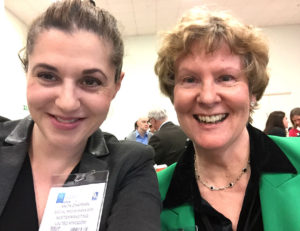 With Anita at the London Book Fair (Photo courtesy of Anita Chapman) Well, Anita and I launched our PR plan nice and early letting HNS members across the world know about the exciting things planned for the conference. Although she lives in the UK and I’m in France, we kept up to date with each other as we rolled the phases out. We even managed a meeting during the London Book Fair earlier this year in April.
Our PR campaign led to record breaking early sales and more importantly generated huge enthusiasm from those who booked to come to the conference. I loved liaising with delegates and hoped I answered all their questions fully! I couldn’t get to many committee meetings, but I kept in touch with Anita, front of house manager Antoine Vanner, bookselling contact Liz Harris and fellow indie co-ordinator Helen Hollick by Skype throughout the run-up.
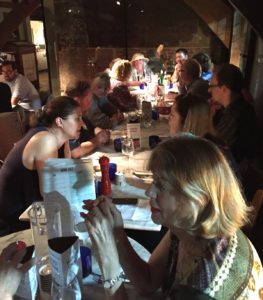
Well, the weekend arrived! Leading the excursion to Blenheim Palace on 2 September was a total pleasure, and a pizza and salad dinner amongst friends (organised by Elaine Powell) was the perfect end to the day. But that was relaxation before the frenzy.
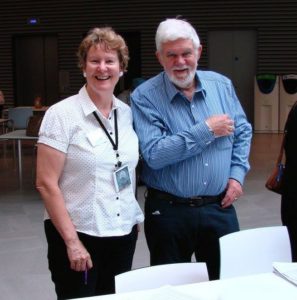 From Friday evening until Sunday lunchtime, I was in perpetual motion! My Fitbit records over 12,000 steps each day! I reported to Antoine, the front of house supremo whom we christened “The Master”. (He does write naval fiction after all!) Streams of delegates were booked in, questions answered, directions given, queries solved. And so it continued for two days. From Friday evening until Sunday lunchtime, I was in perpetual motion! My Fitbit records over 12,000 steps each day! I reported to Antoine, the front of house supremo whom we christened “The Master”. (He does write naval fiction after all!) Streams of delegates were booked in, questions answered, directions given, queries solved. And so it continued for two days.
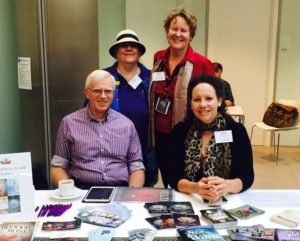 With Derek Birks and Laura Morelli (sitting) and Helen Hollick (standing, left) Helen, Anna Belfrage and I set up the indie table Saturday morning and the first of our (pre-organised) volunteers arrived promptly at 9 am; people buzzed round it non-stop.
Anita Chapman and I had the pleasure of speaking (she more than me) to Michael Caines of the Times Literary Supplement who wrote a splendid piece about the conference.
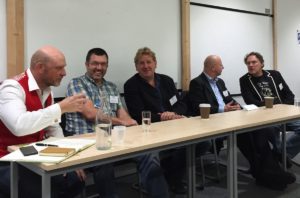 Justin Hill, Matthew Harffy, Harry Sidebottom, Douglas Jackson and Simon Scarrow. Not a clue what Matthew, Harry and I were joking about! I managed to get into a few sessions, including the one on ‘Battle Scenes: Guts, gore and glory’ with Justin Hill, Matthew Harffy, Harry Sidebottom, Douglas Jackson and Simon Scarrow. It was a bit ‘laddish’ but very entertaining. No, I didn’t ask the ‘women in battle’ question as it went past so quickly, there wasn’t time!
AURELIA which was one of the four finalists for the 2016 HNS Indie Award didn’t win, but apparently, the judges had a terrible time deciding. 😉 The joint winners were Lucienne Boyce’s Bloodie Bones and Barbara Sjoholm’s Fossil Island.
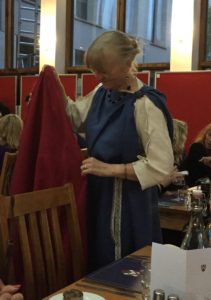 Tilla, the Romano-Briton (alias Ruth Downie)
Scrambling into my frock and posh shoes for the gala dinner, I was disappointed to see the weather had made good its dark promise: it was belting down. Raincoat to the rescue… The bonus was that we had a Roman at our table. Well, Romano-British if we are truthful!
On Sunday, Tracy Chevalier was on excellent form, succinct and clear: “The past is what happened, history is the account we make of it.” I remember her talk at the London Book Fair – entertaining yet full of sound common sense.
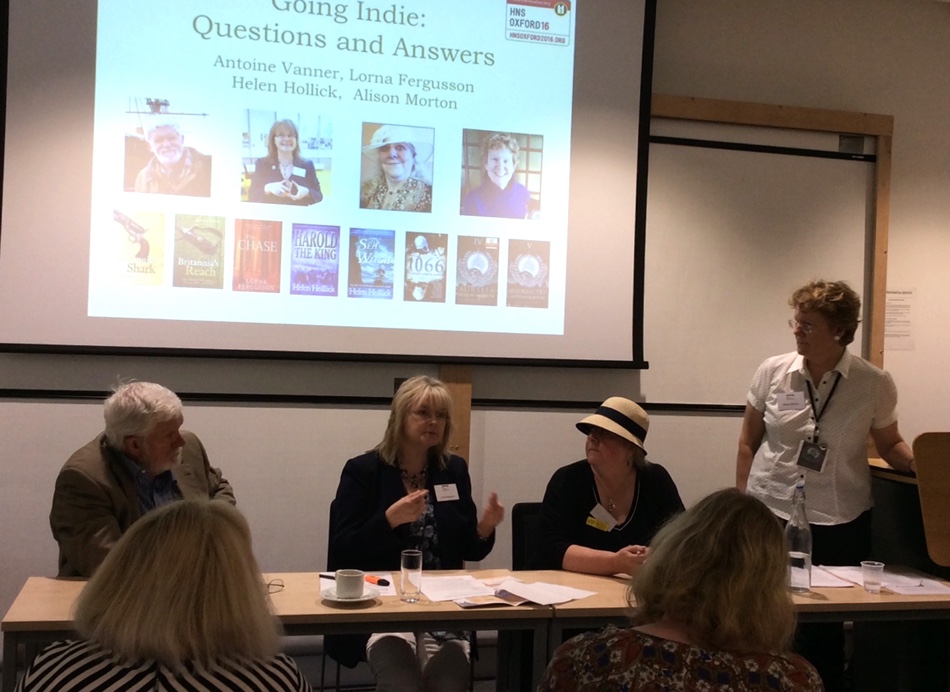 Antoine Vanner, Lorna Fergusson, Helen Hollick and me Our panel ‘Going Indie: Questions and Answers’ with Antoine Vanner, Lorna Fergusson, Helen Hollick and me had a packed house, even a couple of people standing!
Unfortunately, Helen had eye problems so handed over the reins to me. We had so much to pack into an hour and all the panellists were passionate about striving for quality, retaining control and communicating with readers. Helen Hollick explained about the HNS Indie Review scheme, Antoine Vanner gave his marketing expertise, Lorna Fergusson explained the intricacies of editing and I frightened everybody by saying what a lot of hard work it was.
We’d be here all day if I noted down all the friends and colleagues I spent time with over the weekend and I’m bound to miss somebody out, but I was particularly pleased to have a good coffee chat with Chris Gortner with whom I’d shared a book signing table with last year at HNS Denver, my agent Carole Blake, Douglas Jackson (who endorsed INSURRECTIO!), Anna Belfrage, Elizabeth Chadwick and the delightful Ruth Downie.
My sincere thanks to the indie table volunteers: Derek Birks, Laura Morelli, Lucienne Boyce, Nicky Moxey, Anna Belfrage, Jane Steen and Elizabeth Johns. Helen and I were delighted but not surprised by the mutual support that exists between indie colleagues and the buzz they created.
Oh, and I sold and signed a few books…
Alison Morton is the author of the Roma Nova thriller series, INCEPTIO, PERFIDITAS, SUCCESSIO and AURELIA. The fifth in the series, INSURRECTIO, was published in April 2016.
Find out more about Roma Nova, its origins, stories and heroines…
If you enjoyed this post, do share it with your friends!Like this:Like Loading...
|
Subscribe to Blog via Email
Join 50 other subscribers.
Categories
Archive
|
 Today, I’m delighted to welcome Ruth Downie back to the Roma Nova writing world. She’s talked before about historic truth and donkey poo, and wrote a poignant account ‘from below’ at the court of Boudica as part of A Year of Ravens. Of course, Roma Novans know her as the name on the endorsement for AURELIA.
Today, I’m delighted to welcome Ruth Downie back to the Roma Nova writing world. She’s talked before about historic truth and donkey poo, and wrote a poignant account ‘from below’ at the court of Boudica as part of A Year of Ravens. Of course, Roma Novans know her as the name on the endorsement for AURELIA.  Ruso and Tilla and their new baby daughter have left Roman-occupied Britain for Rome itself. Their excitement is soon dulled by the discovery that the grand facades of polished marble mask an underworld of corrupt landlords and vermin-infested tenements. There are also far too many doctors—some skilled, but others positively dangerous.
Ruso and Tilla and their new baby daughter have left Roman-occupied Britain for Rome itself. Their excitement is soon dulled by the discovery that the grand facades of polished marble mask an underworld of corrupt landlords and vermin-infested tenements. There are also far too many doctors—some skilled, but others positively dangerous.
































